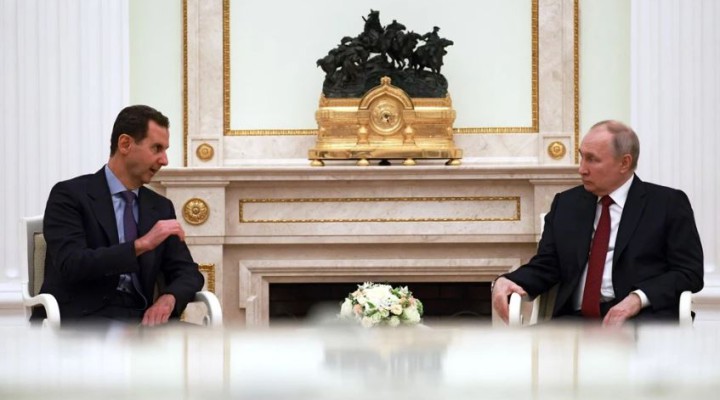
The Assad-Putin summit in Moscow
Keep up to Date & Bypass the Big Tech Censorship
Get uncensored news and updates, subscribe to our daily FREE newsletter!
Could a Turkish-Syrian reconciliation be in the making?
The conspicuous absentee at Wednesday’s summit in Moscow between the presidents of Russia and Syria was their Turkish counterpart Recep Tayyip Erdogan. The outcomes of the meeting could be decisive in determining whether he and his party remain in power. He is probably desperately awaiting a call from Vladimir Putin to tell him whether or not a three-way meeting with Bashar al-Asad is on the cards before the presidential and parliamentary elections in May.
Chinese President Xi Jinping’s initiative led to a reconciliation between the Middle East’s two biggest countries, Saudi Arabia and Iran. His major ally Putin would like to replicate that achievement on the region’s western flank, reconciling Turkey and Syria and resolving their disagreements. Success in this endeavour would deal a slap to the face of the USA and advance the Sino-Russian plan to uproot its influence from the resource-rich Middle East.
| Recommended Books [ see all ] | ||||
|---|---|---|---|---|
 |  |  |  |
 |
The top issue on the agenda of the meeting between the Russian and Syrian presidents was the prospect of restoring relations between Syria and Turkey on a basis that complies with the Syrian state’s conditions. The most important of these are Turkey’s withdrawal from all Syrian territory and the return of the four million or so Syrians who took refuge in Turkey at the start of the war on Syria. Other issues, such as reconstruction and increasing economic cooperation, remain secondary.
Iran, Russia, and China hope an election win by Erdogan and his party, enabled by the Russian initiative, would undermine US influence in the region. They worry the six-party opposition coalition that has been formed to oppose him will align with the US and the West.
But the popularity of Erdogan and his government is plummeting, especially after its flawed handling of the earthquake disaster and with the economy and currency collapsing.He needs an agreement with Syria in order to repatriate the refugees who have been turned into a key issue by the opposition, which officially promised Asad to repatriate them, withdraw all Turkish forces, stop supporting Syria Islamist rebels, pay reparations for Erdogan’s intervention, and contribute generously to Syria’s reconstruction.
Asad insists on a full withdrawal of Turkish forces from Syria and iron-clad guarantees as a precondition for meeting his Turkish counterpart. He does not trust Erdogan, who stabbed him in the back, reneged on the 1998 Adana accord and other agreements between the two countries, and sent his forces in to invade and dismember Syria. He has confined any meetings with Turkey to security issues and resisted Russian and Iranian pressure to engage in political and strategic negotiations. Syrian sovereignty over all Syrian territory takes precedence over all other issues after the Syrian army’s hard-fought 11-year struggle to regain it.
According to a senior Syrian source, Asad strongly opposed a Russian-Iranian proposal to meet with Erdogan in Sochiafter the latter agreed to comply with Syria’s conditions — especially withdrawal from north-western Syria –but only after he is re-elected. The Syrian response was: “in that case, we must wait until after the elections to agree on anything.”
Putin obviously has leverage over Asad. He played a key role in foiling the US conspiracy to dismember his country and bring down the regime. But he doesn’t have the same influence over Turkey, whose president attempts to play on all strings, and keep all channels open to both East and West while preserving his country’s NATO membership. But what worked before the Ukraine war may not work during or after it.
We have yet to see any ‘white smoke’ in the aftermath of the Moscow meeting. But if a four-way (Russia, Iran, Syria, and Turkey) meeting of foreign ministers is agreed upon, it could herald a breakthrough in the Syria-Turkey crisis that meets Syria’s terms and paves the way for a meeting between Asad and Erdogan. That would be a testament to the Russian initiative, Syrian resilience, and Turkish flexibility. It would also deliver a diplomatic coup de grace to the US presence in the Middle East, and signal the start of the Sino-Russian era.
Source: The Asad-Putin summit in Moscow – TheAltWorld


